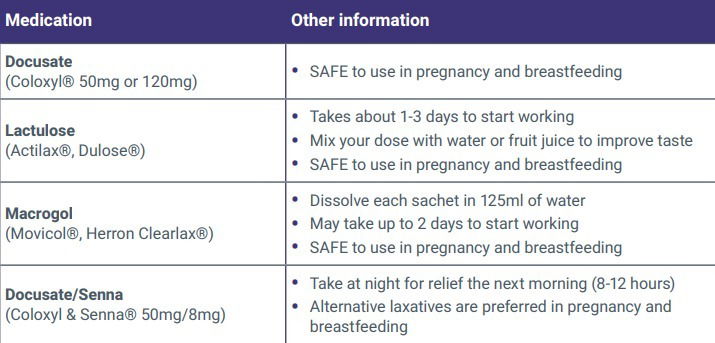Constipation
What is constipation?
Constipation is a change in your bowel habit that involves any of the following:
- The passage of hard stools
- Difficulty passing stools
- Passing stools less frequently than normal.
Numerous factors can cause constipation including medicines, medical conditions and reduced mobility.
Constipation in pregnancy and breastfeeding
Constipation is very common in pregnancy and in the period after birth. Fibre supplements are recommended as the first treatment option. Docusate (without senna), lactulose and macrogol are all safe to use in pregnancy and breastfeeding
Fibre supplements
Fibre is found in a variety of foods such as legumes, fruit and vegetables, nuts, wholegrains and seeds. There are certain laxatives that contain fibre: psyllium (Metamucil®) sterculia (Normacol Plus® and Normafibe®) and isphagula husk (Fybogel®). These are suitable for the treatment of constipation in patients who are able to move around easily and drink lots of water. Constipation may worsen if there is inadequate fluid intake with fibre supplements.
What are some other strategies used to treat constipation?
All people with constipation are likely to benefit from dietary and lifestyle changes. This includes:
- Increased fibre and fluid intake
- Increased exercise (if possible)
- Going to the toilet as soon as you feel the urge to have a bowel motion
Which medicines can cause constipation?
- Antacids
- Iron supplements
- Calcium supplements
- Opioid pain relievers (such as codeine, tramadol and oxycodone)
This is not a complete list. Many other medicines can cause constipation. Speak to your doctor or pharmacist if you would like more information
When should you see your doctor?
Certain signs may require you to see your doctor, such as:
- Blood or mucus (or both) in the stool, particularly black, tarry or red stools
- Persistent or severe abdominal pain and vomiting
- Constipation that persists after 1 week of laxative use
- Constipation alternating with diarrhea or a sudden change in bowel habits lasting for 2 weeks or more
- Unintentional/unexplained weight loss
- Feeling of incomplete emptying of the bowel.
